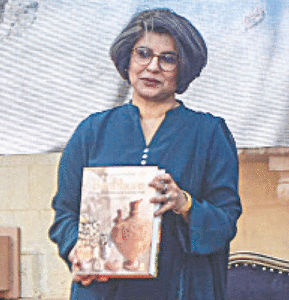KARACHI: “I want to tell children fighting cancer that they must not cry or lose hope. God will help them as He helped me,” said 12-year-old Saifullah, a student of Class VIII now, when asked by Dawn whether he would like to give any message at Childhood Cancer Survivors Day, an event organised by the Indus Hospital on its premises on Saturday.
Saifullah and his parents were invited to the programme as guests with many other children, who had either fully recovered from cancer or were under treatment at the hospital, and their families.
As Saifullah’s parents talked about their son’s love for engineering and how he used to spend time on the hospital bed over a year-long treatment making and building small equipment, it was a pleasure to know that the experience of recovering from cancer changed the way the little child looked at life.
“I no longer want to become an engineer, but a doctor just like Dr Shamvil and treat my patients free of cost. I like him because he doesn’t look like a [typical] doctor. He is different; very simple and caring,” he said with beaming confidence.
On his cancer diagnosis, his parents explained that their son had not been recovering from jaundice for almost three weeks and later was diagnosed with stomach cancer through a biopsy.
‘I no longer want to become an engineer, but a doctor and treat my patients free’
Much older than Saifullah was 20-year-old Shoaib Ahmed, another cancer survivor, who also spoke to the audience during the programme, narrating his experience of battling Bukitt lymphoma, a form of cancer associated with impaired immunity that proves fatal if not treated soon enough.
“I was 12 when I got a pimple on my neck in 2009. It started growing, though I had no other problem and my test reports came out normal,” he said, adding that doctors suggested for him to have an operation to which his parents agreed.
But on the operation day, he pointed out, a senior doctor got a biopsy done before he could go under the knife and he was found to have cancer.
Ahmed was treated at the Children Cancer Hospital (CCH), which later got merged with the Indus Hospital in 2014, for almost two years. The toughest part of the treatment for him, however, was to endure the painful side-effects of chemotherapy.
Like Ahmed, 29-year-old Munir, who recovered from cancer 15 years ago, was all praise for the CCH whose team is now part of the Indus Hospital. “Treatment of cancer is expensive and we are all lucky that we were able to receive that with no burden on our pockets,” said Munir, adding that his treatment for Hodgkin lymphoma took a year and he had had no complications or relapse so far.
Cancer prevalence
According to Dr Shamvil Ashraf, director for medical services at the Indus Health Network, childhood cancer survival rate in Pakistan is very dismal, though it has reached up to 80 per cent in developed countries.
“The reasons are late diagnosis that mainly results from lack of awareness and the fact that we have few good quality cancer treatment facilities in Pakistan. The rate of abandonment once diagnosis is made or treatment starts is high because cancer treatment requires long stay at hospital. But the poor can’t afford that though the patient is offered free treatment,” he said.
Citing some estimates, he said that 8,000 to 9,000 children were diagnosed with cancer every year in Pakistan. Blood cancer was the most common cancer followed by lymphomas, brain tumours, carcinomas (a type of cancer that starts in cells that make up the skin or the tissue lining organs) and retinoblastoma (affecting retina).
One major risk factor for childhood cancers, according to him, is genetic abnormalities and rarely childhood cancer is hereditary. Unlike cancer in adults, childhood cancer is curable if diagnosis is made early.
“You can easily see that from our success stories. Many patients have gotten married and have children now. On the prevention side, parents should discourage consumption of paan, chaalia and gutka. They should also get their children immunised against hepatitis B (a risk factor for liver cancer) and human papillomavirus (a risk factor for cervical cancer in teenage girls),” he said.
Emphasising the need for government intervention, he said: “We can’t win this battle or even bring about a big change unless the government steps in and starts establishing state-of-the-art cancer treatment centres at all major public sector hospitals,” he said.
The event held in collaboration with The Bank of Tokyo-Mitsubishi UFJ Ltd included many entertainment activities, which were thoroughly enjoyed by children and their families.
Published in Dawn, November 26th, 2017













































Dear visitor, the comments section is undergoing an overhaul and will return soon.